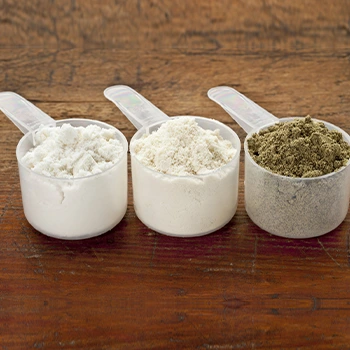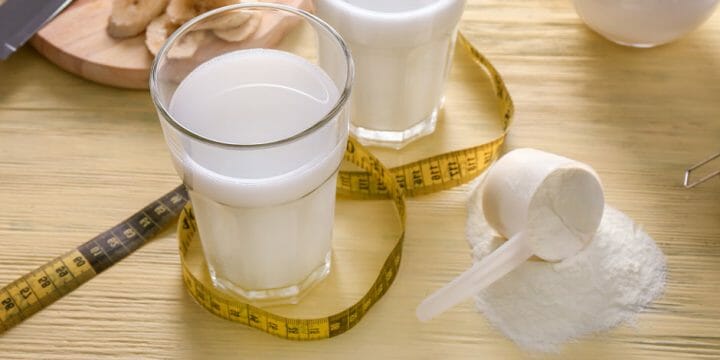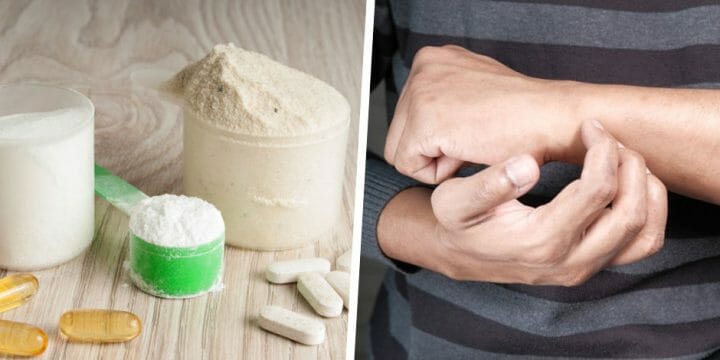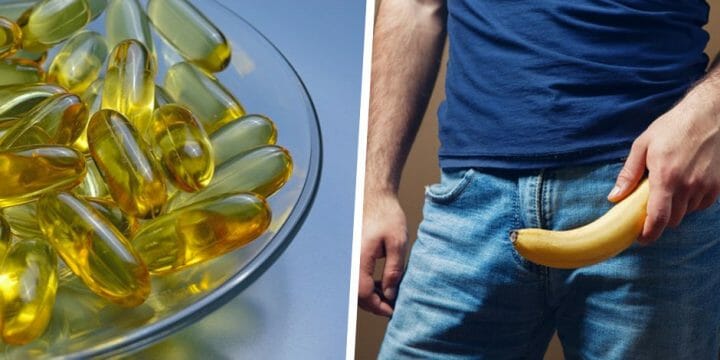People who cannot meet their protein needs through diet alone can take protein powder to help build muscle, boost strength, and lose weight.
As an athletic trainer, I've seen firsthand how protein shakes enhance my clients' and my own fitness routines, sparking my deep dive into their role in muscle building and weight loss.
In this article, I will discuss in great detail what protein powders do to stimulate muscle growth, their health benefits, and their potential drawbacks.
Let's begin.
Quick Summary
What Is the Function of Protein Powder?

Protein powder boosts workout effectiveness, fostering muscle growth.
Muscle growth isn't just about exercise; it also hinges on nutrition's role in healing and rebuilding muscle tissue.
A study in Frontiers in Nutrition shows protein supplements enhance muscle size and strength by spurring protein synthesis in muscles [1].
As per the Nutrients journal, a protein-rich diet also supplies vital amino acids for muscle repair and growth [2].
Moreover, pairing a high-protein diet with hormones like insulin and testosterone may aid in repairing exercise-induced muscle damage, leading to stronger muscles.
Beyond muscle benefits, protein supplements offer other key health perks, keeping us in top shape.
Benefits Of Protein Powder

Protein powder offers a practical and affordable way to build muscle and repair tissue. It also aids enzyme and hormone production, impacting weight loss and chronic condition management.
While protein shakes are beneficial, you should never rely only on them, as you cannot survive only by drinking protein shakes.
Weight Loss
Protein supplementation can help in calorie reduction by affecting appetite-regulating hormones like PYY, GLP-1, and ghrelin, according to a study published in the American Journal of Clinical Nutrition [3].
They can also increase metabolism due to protein's thermogenic effects [4].
Additionally, they aid in gluconeogenesis, converting proteins and fats to glucose, aiding weight loss [5].
Lean muscle retention
In my coaching, I've observed that protein shakes significantly speed up muscle recovery post-workout by elevating blood amino acid levels.
In a 2017 study published in the British Journal of Sports Medicine, the experimental group, which had an average daily intake of about 1.4 grams of protein per kilogram of body mass, was given an extra 36 grams of protein per day to supplement their resistance training [6].
The study discovered that supplementing a high-protein diet increased muscle mass and strength during prolonged resistance training.
Additionally, protein supplementation resulted in a decrease in fat mass and an increase in lean body mass.
Health Benefits Of Protein Supplements
I've noticed in my practice that clients with hypertension or diabetes benefit from protein supplements, which aligns with research showing their role in lowering blood pressure and improving insulin sensitivity [7].
Furthermore, another study published in the Nutrients journal found that protein shake consumption, especially whey protein, was shown to strengthen immune function by reducing inflammation [8].
Also, whey protein has a high concentration of cysteine, which assists the body's natural production of glutathione, an important antioxidant in humans, to reduce oxidative stress [9].
Are There Risks To Consider When Using A Protein Powder?

There are some risks to consider when using protein powders, such as digestive issues, blood sugar spikes, and kidney damage.
"People with dairy allergies or trouble digesting lactose [milk sugar] can experience gastrointestinal discomfort if they use a milk-based protein powder."
- Kathy McManus, Director of the Department of Nutrition at the Brigham & Women's Hospital
However, some of these side effects may be associated with intolerances and allergies, too much protein consumption, and long-term usage.
Upset stomach. Some protein powders, like whey protein, contain high levels of lactose, which can cause bloating, gas, stomach cramps, and diarrhea in people with lactose intolerance [10].
Blood sugar spikes. Some ready-to-drink protein shakes contain added sugar. Furthermore, some people increase their sugar and calorie intake by blending protein shakes with honey and milk, resulting in blood glucose spikes and possible weight gain, according to Harvard Health [11].
Kidney damage. Protein powders might contain high levels of mercury, cadmium, lead, and arsenic. Research published in the Nephron Physiology journal suggests that prolonged exposure to heavy metals may be harmful to the kidneys [12].
What Is the Difference Between Protein Powders?

Protein powders mainly differ in their amino acid profiles.
Research shows whey and casein are complete proteins, containing all essential amino acids [13]. They're also often enriched with vitamins and minerals, enhancing their nutritional value.
In addition to having a full profile, they also have higher amounts of some important amino acids than other plant-based protein powders such as rice protein, soy protein, and pea protein.
Whey protein, being fast-acting, speeds up muscle protein synthesis more than slow-digesting casein [14]. But casein is ideal for sustained muscle nourishment and perfect for overnight use.
Whey protein supplements also boost insulin sensitivity, antioxidant levels, and bone density, per the Journal of Functional Foods [15].
However, WebMD notes that whey may cause issues for lactose-intolerant individuals, though whey isolate offers a lactose-free alternative [16].
And for those watching carbs, some powders are specially low-carb.
References
- https://www.ncbi.nlm.nih.gov/pmc/articles/PMC6142015/
- https://pubmed.ncbi.nlm.nih.gov/37764784/
- https://pubmed.ncbi.nlm.nih.gov/16400055/
- https://pubmed.ncbi.nlm.nih.gov/15466943/
- https://pubmed.ncbi.nlm.nih.gov/19640952/
- https://bjsm.bmj.com/content/52/6/376
- https://pubmed.ncbi.nlm.nih.gov/19893505/
- https://pubmed.ncbi.nlm.nih.gov/25671415/
- https://pubmed.ncbi.nlm.nih.gov/12537959/
- https://www.sciencedirect.com/science/article/abs/pii/B9780128097625000164
- https://www.health.harvard.edu/staying-healthy/the-hidden-dangers-of-protein-powders
- https://pubmed.ncbi.nlm.nih.gov/15722646/
- https://www.ncbi.nlm.nih.gov/pmc/articles/PMC6245118/
- https://www.webmd.com/diet/whey-vs-casein-protein
- https://www.sciencedirect.com/science/article/pii/S1756464615004570
- https://www.webmd.com/diet/difference-whey-and-whey-isolate
About The Author
You May Also Like






